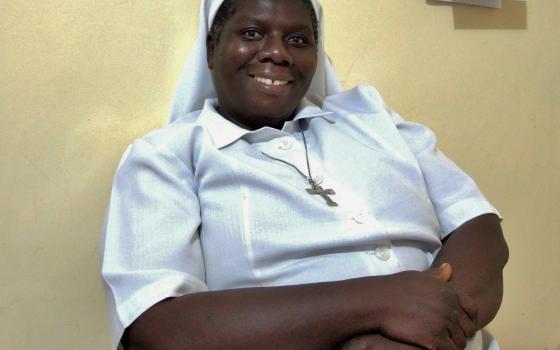Sr. Pauline Longwani, a part of the Franciscan Sisters of Assisi congregation, recently returned from six years of missionary work in Italy. Originally from the Copperbelt parish in northern Zambia, Longwani is now living in Solwezi and waiting for her teaching certification to be approved by the local education board. Global Sisters Report sat down with Longwani to learn more about what it was like to serve in another country and how she dealt with the challenges of language and racism.
Tell me a little bit about your work in Italy.
I went to Italy in 2008. Because we are an international congregation, sometimes the mother general asks us to give our services to other members in different countries. I was asked to go and help the aged in Italy. I also worked for three of the years at a Franciscan spiritual retreat center, where I met sisters from around the world. I was in Italy for six years.
How was it being an African sister in Italy?
Before, I thought the whites were supposed to come and be missionaries in our country, in Africa. It was very interesting that I, a sister from Africa, was a missionary in Europe. At one point I was invited for a meeting of international missionaries in Europe. I could not believe how many sisters from different countries are coming to work in Europe. The presenter told us, now it’s Europe who needs missionaries.
It’s strange because, if you look at the Franciscan order when they came to Zambia in 1961, they were all Italians. Now we are 130 sisters in the country and only two are Italian – almost all the sisters are Zambian. We have 18 Zambian sisters working in Italy and the superior general of the Franciscans is a Zambian.
What were your favorite things about Italy?
At the retreat center, I encountered many people [in Europe] who longed to know more about God. For me, it was encouraging, that even nowadays with this technology and type of life, people are still searching for God. It gave me an inner strength to carry on, because I said, ‘Okay, I'm not mistaken in the life I’ve chosen.’
Also, the foods of Italy are delicious. I enjoyed them until they told me I put on too much weight and I had to reduce.
It was a very nice experience, coming from Africa, especially Zambia, where our land is so flat. I really enjoyed the mountainous landscape of Italy. It's lovely how you see the mountains grabbing at each other and all of the flowers and, above all, the greenness. That was really nice. I experienced no dust for six years. [Due to the mining activities, the Copperbelt and Solwezi are always filled with dust kicked up by heavy machines and trucks]. No dust! Imagine. I could wear my shoes without polishing them all the time!
Did you experience racism?
When I first arrived, I felt it so much, especially because I was working with the elderly. The old women sometimes they would call me ‘diablo,’ which means the devil. They'd tell me, ‘I'm white, and you're black because you were put in the oven [of hell].’
You know, I could take it in that way and be offended. But their mentality is totally different from the modern mentality. With the young people I had no problem. As time went on I just had to accept it, because that's life. But with the younger generations I didn’t feel it because there's so many Africans there now.
What were some of your other challenges?
Although I loved Italy, I missed home, because home is home. It made me appreciate all the people that come to Africa to evangelize, because it's not an easy task to be away from home. I missed the people. In Africa people are so outgoing, people are always greeting each other, and you can talk to anyone at any time. I missed that in Italy. The language was also very difficult. It’s the opposite of everything I know in English.
Do you have advice for other African sisters serving in Europe?
I remember this one day when it was so windy and I had to walk from the convent to the church, so I tied my chitenge around my waist [a chitenge is a multi-purpose swath of fabric many African women use to carry babies or to protect their clothes while traveling]. They asked me why I used it and I told them I was worried about my dress blowing up around my thighs. I can't keep my dress down and hold the veil at the same time! But all the sisters were looking at it and saying ‘bella, bella’ (how beautiful!). It’s because I was showing my African identity. So when you're going to Europe, be a good witness. Show them you're an African who is proud of your culture, who is proud of what you believe, and stand by what you believe.
[Melanie Lidman is Middle East and Africa correspondent for Global Sisters Report based in Israel.]

